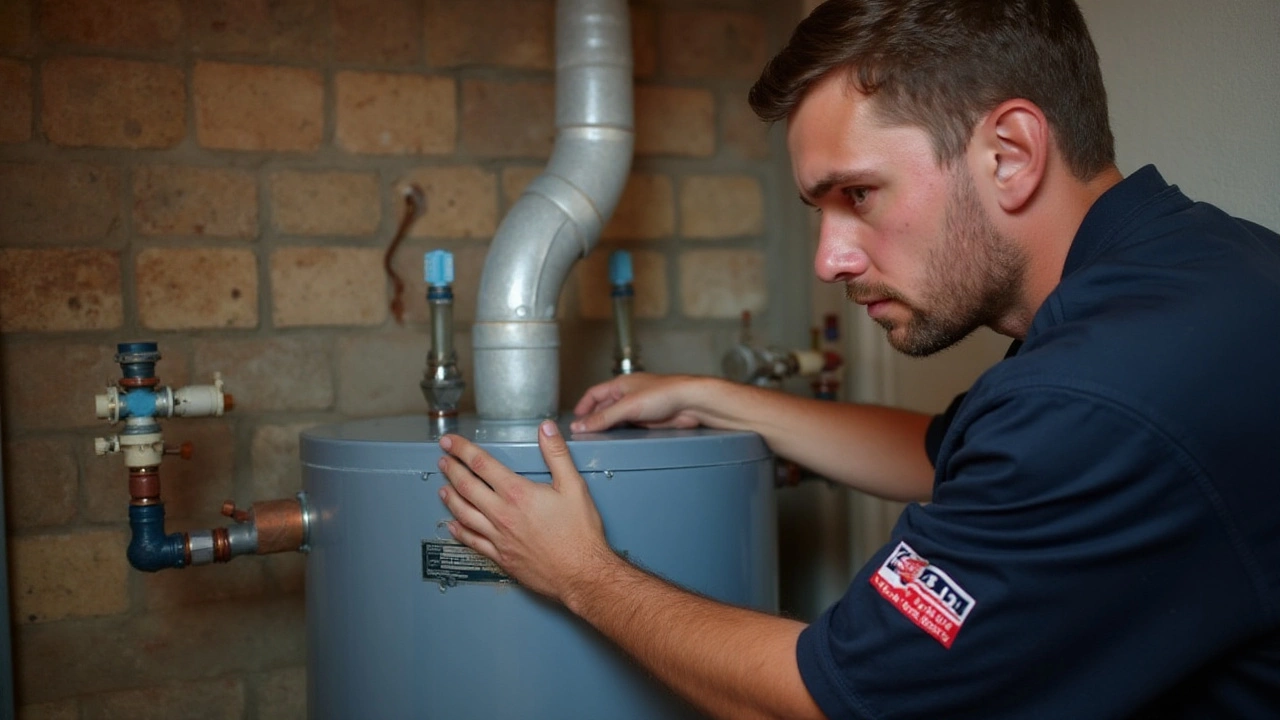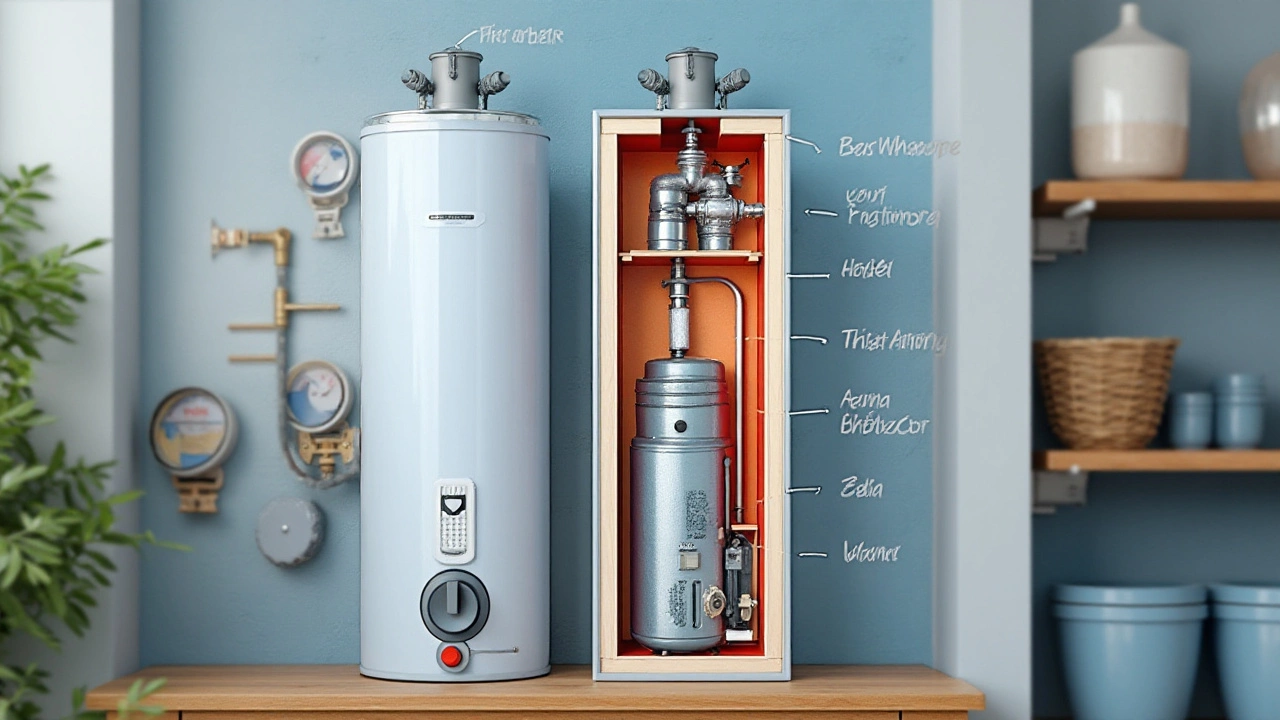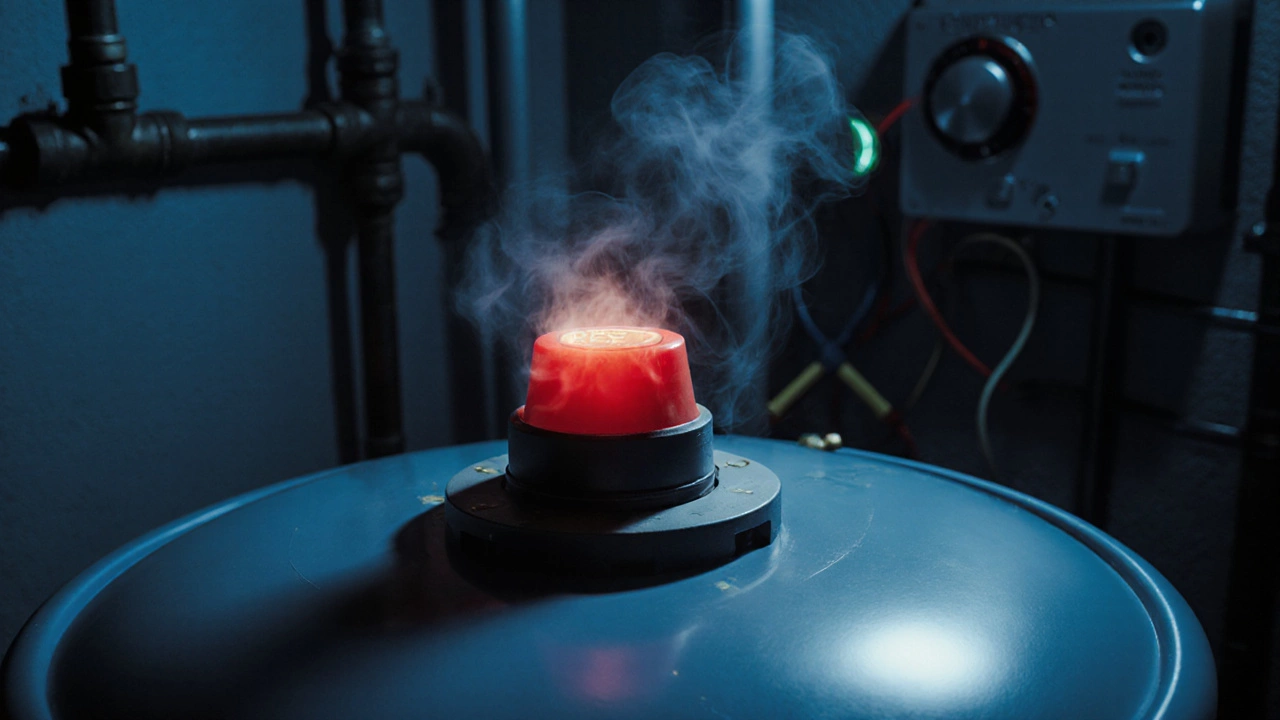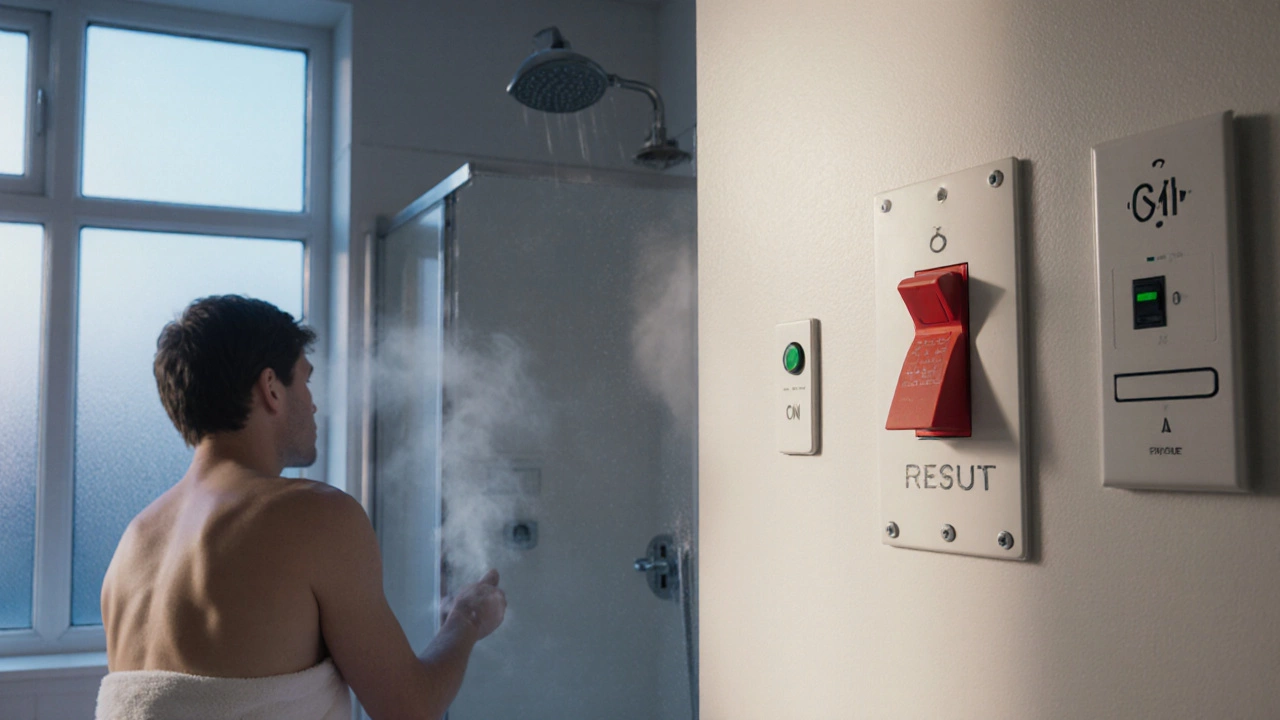
- 9 Jul 2024
- Gideon Thornton
- 0
In the hidden depths of your water heater lies an unsung hero—the anode rod. This humble component plays a crucial role in keeping your water heater in pristine condition, safeguarding it from the relentless attack of rust and corrosion. Over time, this sacrificial component slowly depletes as it protects the inner lining of the tank.
The cost to replace an anode rod varies based on several factors, yet making this investment could very well save the heartache of replacing an entire water heater. Let's dive into the details, explore the types available, and consider the options for tackling this maintenance task. Whether you're a DIY enthusiast or prefer professional help, this guide aims to provide insights to keep your water heater performing smoothly and efficiently.
- What is an Anode Rod?
- Why is Replacing the Anode Rod Important?
- Types of Anode Rods and Associated Costs
- DIY vs Professional Replacement: Pros and Cons
- Signs Your Anode Rod Needs Replacement
- Tips for Extending Water Heater Lifespan
What is an Anode Rod?
The anode rod may seem like a minor component of your water heater, but this slender metal rod is truly a cornerstone of its longevity and efficiency. Typically made of magnesium, aluminum, or a mix of aluminum and zinc, these rods are intentionally designed to corrode over time. When metal in the tank is exposed to water, it seeks any available opportunity to oxidize, and that's where our helpful rod steps in. It sacrifices itself, corroding in place of the water heater tank itself, thereby preventing rust and extending the life of your appliance.
This process by which the anode rod breaks down to protect the tank is known by a curious name: galvanic action. This term describes how metals with different properties interact with the water and each other. The softer metal of the anode rod becomes the target for the corrosive elements present in tap water, rather than allowing those elements to attack the strong, yet inevitably vulnerable, steel lining of your heater. This beautiful symphony of science keeps your heater humming along worry-free.
The presence of an anode rod in your water heater is a testament to the tank's resilience against harsh elements found in water, such as minerals and dissolved solids. Without the rod, these would attack the tank's walls and lead to leaks or even tank failure. Regular inspection of this component could be the key to preventing unexpected heater breakdowns. It's often said that the secret to mechanical longevity is crisp and timely maintenance, and with an anode rod, this has never been truer.
"The anode rod is arguably the most important maintenance aspect of the water heating system - a few minutes of inspection saves years of unexpected damages," states plumbing expert Richard Trethewey. His words underscore the absolute necessity of being proactive when it comes to preserving the condition of your water heater. Understanding the function of this unsung hero can save a homeowner from facing the dreaded cold shower or unexpected repair bills.
To provide a clearer picture of how crucial an anode rod is, consider that without its presence, the average water heater's lifespan could diminish severely, even cut in half. In practical terms, this could mean buying a new water heater every four to five years rather than enjoying two decades of reliable performance. Regularly ensuring that your anode rod remains within its functional limits is thus a small act of diligence with significant payoffs.
Why is Replacing the Anode Rod Important?
Imagine having a healthy water heater for years to come without the nuisance of unexpected breakdowns. This reality hinges on a critical yet often overlooked component—the anode rod. But why does this seemingly small part play such a vital role in the longevity of your water heater? The answer lies in its sacrificial nature. An anode rod is specially designed to corrode and deteriorate over time, sparing the inner lining of the water heater from rust and corrosion. As it selflessly takes the hit from corrosive elements, it effectively prolongs the life of your water heater, keeping it in optimal condition.
Water heaters, like any appliance, are subject to wear and tear, accelerated by the corrosive action of substances found in water. Minerals such as calcium and magnesium, usually present in hard water, can wreak havoc on your appliance. Without the protective presence of an anode rod to absorb these minerals, your water heater would succumb to rust at a much faster rate. The anode rod acts as the first line of defense, diverting corrosive forces away from the tank itself. It's like a knight's armor, taking the brunt so the body stays intact.
Replacing the anode rod at regular intervals is therefore non-negotiable for the health of your water heater. If left unchecked, a depleted anode can lead to severe corrosion, eventually resulting in a leaky tank. According to industry data, a failed anode rod is responsible for a significant percentage of water heater failures, many of which occur well before the expected lifespan of the appliance. Replacing the rod, however, is like administering a booster shot, renewing the water heater's defenses and potentially adding several years to its life.
Jim Sanderson from Water Heater Pros mentions, "Neglecting the anode rod can transform a simple fix into a costly replacement. Timely maintenance ensures your appliance performs as expected while saving you from hefty expenditures."
Consider the financial implications as well. The cost of replacing an anode rod is relatively small compared to the price of a new water heater. Think of it as wise insurance against premature appliance failure. The savings on energy bills and the reduction in repair costs quickly justify the expense. A well-maintained water heater functions more efficiently, requiring less energy to heat water. This is especially crucial in regions where energy costs are high, translating into meaningful financial relief for homeowners.
Not all anode rods are created equal, though. Varieties like magnesium and aluminum have distinct attributes, each suitable for different conditions and types of water. The choice of material affects how effectively the rod protects the tank, emphasizing the need to choose wisely based on your water composition. Regular inspection and replacement are advised to ensure your water heater remains shielded from corrosion at all times.

Types of Anode Rods and Associated Costs
When it comes to extending the life of your water heater, one of the most effective measures you can take is replacing the anode rod. Understanding the different types of anode rods available and their associated costs is crucial if you wish to tackle this maintenance task wisely. Most water heaters originally come equipped with a magnesium anode rod. Magnesium is highly effective at preventing corrosion, though it may deplete more quickly in certain water conditions, particularly if your water is acidic or soft. A typical magnesium rod can cost between $20 to $40. While they might need more frequent replacement, they offer superior protection in ideal water conditions.
Then there's the aluminum anode rod, which is a bit more wallet-friendly, usually priced from $15 to $30. These are particularly suitable if your water is hard. Aluminum rods are durable; however, some people express concerns over potential health risks associated with aluminum leaching into the water supply. It's worth considering this if your water is used for drinking. Here's a fun tidbit: did you know that aluminum rods work better in hotter climates because they can handle the higher temperatures?
Another option you might encounter is a zinc/aluminum anode rod. These hybrids, which typically range from $25 to $60, are designed to combat not only corrosion but also the smelly water issue caused by sulfur-reducing bacteria. Many people find payback in the lack of that troubling rotten egg odor.
According to Consumer Reports, "Choosing the right anode rod depends significantly on your local water chemistry, and a little testing can save significant headaches down the road."
Finally, we have the powered anode rod. A marvel of modern engineering, this rod doesn't sacrifice itself like the others; instead, it uses electrical current to control corrosion. These are particularly advantageous in homes with softened water, where traditional rods could fail prematurely. However, they come at a premium, often costing between $100 and $200. They have a virtually indefinite lifespan, so the initial investment can be worth it in areas with harsh water conditions.
Replacing your anode rod not only depends on its type but also on where and how you choose to buy it. Purchasing online could save you some bucks as opposed to hitting the local hardware store. Also, installing it yourself? You’re just paying for the rod. However, if you're not handy with a wrench, hiring a professional could add another $50 to $150, depending on your location and the complexity of the job. Water heater repair doesn’t have to be financially draining, especially when you’re knowledgeable about the options available. Remember, extending your water heater’s life boils down to investing in the right components today!
DIY vs Professional Replacement: Pros and Cons
Choosing whether to tackle the anode rod replacement yourself or to hire a professional can be quite the conundrum. For those with a knack for home improvement projects, the DIY route may offer the satisfaction of having saved a buck or two. Replacing the anode rod isn't the most complex of repairs, but it does require a touch of patience and a bit of know-how. These components can be pesky and corroded, and unscrewing them may sometimes feel like persuading a stubborn jar lid to give way.
There are advantages to doing it yourself beyond just cost savings. It lends you the opportunity to educate yourself about the inner workings of your water heater. Plus, the sense of accomplishment can be immensely gratifying. However, one should tread with caution; a slip of the wrench or a misstep could lead to leaks or damage, costing much more than the initial repair. Always shut off power to the appliance and relieve pressure before commencing any work.
Expert Help: A Deeper Investment
Hiring a professional comes with its own set of benefits. A skilled technician can have your anode rod replaced in no time with little to no fuss. They’re seasoned in spotting potential issues you might overlook. For instance, recognizing signs of extensive corrosion or assessing the overall health of your water heater beyond the anode rod. Though the service requires an outlay higher than the DIY cost, it eases the stress and potential mishaps of doing it on your own.
"Having your water heater serviced by professionals ensures thorough inspection and can significantly extend its lifespan," advises Jane Clark, a leading expert in home appliance maintenance.
The costs associated with hiring a professional can range significantly based on your location and the type of anode rod needed. Not to mention, some contractors may include additional checks in their service packages, providing peace of mind through professional assurance. But remember, if hiring, ensure you're working with a reputable specialist with the relevant certifications to avoid substandard workmanship.
The Middle Ground
In some situations, considering a middle-ground approach makes sense. This involves procuring your anode rod and having a professional install it, potentially reducing service fees. For those uncertain about the DIY approach yet keen on reducing costs, this can be a viable strategy.
Ultimately, the choice between going DIY and hiring a pro boils down to an individual’s comfort level with home repairs, budget, and the value placed on time versus money. Weighing these factors helps determine the best path for maintaining that trusty water heater in top-notch condition.

Signs Your Anode Rod Needs Replacement
Every technological marvel, even those hidden from sight like the anode rod, gives signs that it needs attention before it completely fails. Typically made of soft metals like magnesium or aluminum, the anode rod gradually wears away, executing its duty of safeguarding your water heater from internal rust. When it's time for a change, the water heater shares some telltale signs. One common indicator is a distinct, unpleasant smell resembling rotten eggs. This odor results from the interaction between the anode material and naturally occurring bacteria in the water, known as sulfate-reducing bacteria. Addressing this promptly not only freshens the odor but also ensures the anode rod continues its work.
Another clear sign would be the rust-colored water streaming from your faucets when you turn on the hot water. Such discoloration indicates the anode rod is nearly spent, leaving the tank susceptible to rust formation. In inspecting the tank, visible corrosion or sediment buildup, easily discernible through an inspection hole or drain valve, further signals the rod's depletion. When water heaters lose their protective anode, they start deteriorating more quickly, leading to expensive replacements if not immediately addressed.
Moreover, you might notice unusual noises emanating from the water heater. These can range from popping to crackling sounds originating from the built-up sediment and minerals reacting within the tank. An active anode rod continually minimizes these deposits, and excessive noise can therefore signify the rod's ineffectiveness. At this juncture, seeking a replacement becomes vital to prevent mineral buildup that might lower efficiency or cause damage.
"The most vital maintenance task in ensuring the longevity of a water heater is checking the integrity of your anode rod," advises Home Improvement Expert, Bob Vila.If ever in doubt, a professional inspection can confirm whether the rod requires replacement, ultimately saving the tank and extending its life.
Let's not overlook another vital sign—decreased water temperature efficiency. Should you observe that your water heater struggles to maintain its usual warmth or requires additional time to heat up, the internal components might be working under duress because of corrosion. This scenario warrants checking the anode rod promptly. Familiarity with these signs and understanding when action is needed proves integral in maintaining the reliability and efficiency of your water heater. Proactively replacing the anode rod when necessary prevents potential expenses and the inconvenience of untimely repairs.
Tips for Extending Water Heater Lifespan
To extend the lifespan of your water heater, regular maintenance checks are crucial. Proactively inspecting your appliance can save you from costly replacements down the line. Start with a routine inspection every three months. During these checkups, pay close attention to signs of wear and tear or leakage around the base and connections. Addressing small issues promptly can significantly extend the life of your water heater, putting less strain on its components.
One of the simplest yet effective ways to maintain your water heater is by flushing the tank. Sediment build-up at the bottom can cause the heater to work harder to warm the water, greatly reducing its efficiency and life. Flushing the tank once a year helps prevent this build-up. To do this, simply turn off the appliance and attach a garden hose to the drain valve located at the base. Open the drain valve and allow the water, along with any accumulated sediment, to flow out until it's clear.
Regular anode rod inspections also play a vital role. As a protective piece, the anode rod should be inspected annually and replaced every three to five years. Choose the rod type that best suits your water heater and local water conditions. For example, aluminum anodes are beneficial in hard water areas, whereas magnesium rods are ideal for soft water. Anode rod replacement is a simple yet impactful step in ensuring your water heater lasts many years.
Keep an eye on the thermostat setting. A recommended setting of about 120 degrees Fahrenheit ensures efficient heating while preserving the internal components of your heater. Higher settings not only increase energy consumption but can also pose safety risks. Lowering the temperature reduces the energy needed to heat water and can prevent scalding while showering or washing up.
Consider Professional Maintenance
Engaging professionals for deeper assessments and maintenance can be a wise decision. Experts will provide insights and proactive measures that might not be apparent during self-checks. According to a study conducted by the Water Heater Repair Association, heaters that undergo annual professional maintenance last 15-20% longer than those that don't. Bringing in experts allows for diagnosis of issues before they become severe, and provides peace of mind that your appliance is at its best performance.“Regular maintenance is the key to the longevity of water heaters. Maintenance not only prevents malfunctions but enhances performance.” — Water Heater Repair Association
By following these measures, not only can you extend the lifespan of your water heater, but you will also ensure its efficiency. Longer appliance life, fewer emergency repairs, and reduced energy costs are simple results of consistent maintenance efforts. Take the time to nurture your water heater, and it will serve you well for many years to come.




